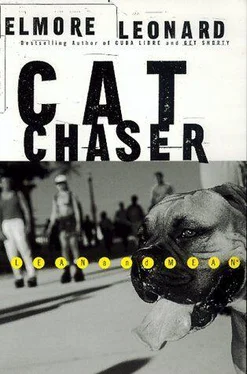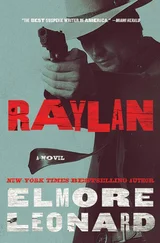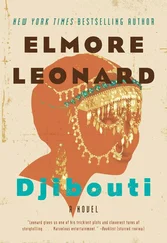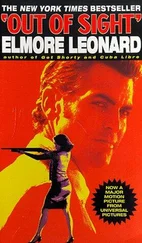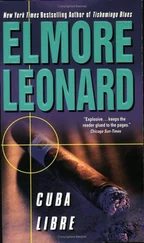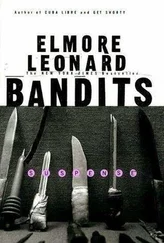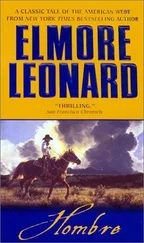“The thing about it is,” Rafi said, “you have to know what is a sign and what isn’t. You can be wrong about signs, sometimes interpret them the opposite of what they mean.”
“You’re still crazy,” the dealer said.
Rafi used restraint. He said, “Am I?” and left the dealer with that, a secret smile that told nothing because it had nothing to tell. At least for the time being.
He would have to be more attentive in reading signs.
The Cat Chaser’s notice in the paper and the business about it on the radio had alerted Rafi, immediately captured his interest. He talked to people who referred him to others who had taken an active part in the rebellion and there it was, once he put the pieces of the story together: an approach, a way to play a feature role in this, using an old knife scar to represent a bullet wound. He saw in his mind a crude scenario that went:
RAFI: I’m the one you shot sixteen years ago.
MARINE: Oh, I’m so sorry. What can I do to make amends?
RAFI: Please, nothing.
MARINE: I insist.
RAFI: Well, as one businessman to another (assuming the marine was now a businessman), I could tell you about a most unusual investment opportunity…
Something, in essence, like that. Make it up, get his check; gone. But now the mystery woman had entered the picture and the scenario was changing before Rafi’s eyes, the woman the Marine called Mary emerging to become, possibly, the key figure. So far it was only a feeling Rafi had. But to a man who lived by signs and instinct, what else was there?
THEY DESCENDEDa spiral iron stairway fifty feet into the ground to dine in a cave, a network of rooms and niches like catacombs where tables were set with candles and white linen and Dominican couples danced to the percussion sounds of merengues . The old city and this place, no Coca-Cola or Texaco signs, Rafi said. This is Santo Domingo.
He told them he had begun to make inquiries about Luci Palma, but so far had learned nothing. It might take a little more time.
Moran tried to convince him it wasn’t important, but Rafi insisted; he was curious about Luci now himself. What could have happened to her? He ventured the possibility she had become a full-time revolutionary and fled the country. Like Caamaño, who had led the revolt in ’65; he left the country, returned and was shot. It happened.
They talked about that time sixteen years ago, the situation. Moran said it had been impossible to understand, being here in the middle of it. The rebels kept saying to them, “Can’t you tell your government we aren’t Communists?” It didn’t begin to make sense. Almost all the people were friendly; still, guys he knew were getting killed. He read about the situation later and decided they had helped the wrong side-just as they’d been helping the wrong side in Latin America for eighty years. Like Nicaragua, helping that asshole Somoza against the Sandinistas, the good guys. Except look at the good guys now. They just shut down a newspaper for criticizing them; they were doing the same thing Somoza did. What happens to good guys once they get control?
Mary said they have the right to make mistakes like anyone else. Don’t assume anything; don’t label people. She said, What if a skid-row bum asks you for a handout? Are you going to qualify him, give him the money only if he promises not to spend it on booze? No. Once you give him the money-and it’s your choice whether you do or not-then it’s his, with no strings. He can spend it on anything he wants. He can screw up or not screw up, that’s his choice. Unless you’re buying him. That’s something else.
Wine with dinner conversation: a bottle of red with the sopa Dominicana that was like beef stew with noodles; white wine with the sea bass simmered in a peppery tomato sauce… Rafi hanging on every word: Moran’s basic sympathy with the underdog, the revolutionary, maybe with a few minor doubts; while the woman’s analogy said don’t expect too much, don’t be surprised. Interesting; what Rafi considered the usual man-woman positions reversed. The woman using reason-at least, he assumed, until one got inside her pants. The man asking questions of what he’s learned-but essentially, typically, an American bleeding heart.
Yes, it looked good.
Rafi excused himself. He visited the men’s room, came out and entered the bar area that was set apart, like a passageway in the cave, only a few couples here having drinks. At the far end of the bar was La Perla with her daiquiri, holding the big snifter glass in both hands beneath a pink glow, staring into the glass, an old woman in theatrical makeup, amber costume jewelry; a gypsy fortune-teller, a magic act waiting to go on.
“Tell me,” Rafi said, tense now, expectant.
“Yes, I have her picture.”
“I knew it! Who is she?”
“You don’t know anything,” the woman, La Perla, said. “We have to negotiate this some more. The shrimp cocktail isn’t going to do it.”
Now Rafi had to decide whether to give in to his impatience or play with the old woman, croon a few false notes to her, put his hand on the curve of her narrow back. But he was tired and he didn’t care to feel old bones. He said, “Buy your own rum,” and started away.
“She comes to Casa de Campo…”
He paused. “Yes?”
“… for the polo. But without her husband.”
“Ah, she’s married; I knew it. And he’s rich, uh?”
“I’m starving,” La Perla said. “I want the entrecote, asparagus with hollandaise…”
Rafi raised a hip to the empty stool next to her, her perfume overpowering him as he leaned close.
“Why don’t you order whatever you like.”
“I still want the large shrimp cocktail.”
“You should have it,” Rafi said. “Who’s her husband?”
“You won’t believe it when I tell you.”
“I promise I will,” Rafi said.
“He’s Dominican.”
There was a pause between them; silence.
“But he can’t come here with her,” La Perla said.
“Why is that, if he’s Dominican?”
“Somebody would shoot him. Many people would shoot him if they could.”
It was a game. Rafi tried to think of names-expatriates, political villains-anxious now, trying too hard, as though a buzzer were about to go off and he’d lose.
“He’s rich, isn’t he? He has to be, with an American wife who likes the polo.”
“You won’t believe it when I tell you,” the woman said again. “I think I want a bottle of wine also. A full bottle of Margaux.”
“When you tell me who it is,” Rafi said, “have whatever you like. With my love.”
The woman tapped the bar, rings rapping on the varnished wood. “Put the money here for my taxi and my dinner,” she said. “But keep your love. I don’t want to destroy my appetite.”
There was not a noticeable change in Rafi when he returned to the table; they talked about Reaganomics and taxes and the price of automobiles. In Rafi’s own mind, though, he was at once more cautious, even more observant. If the woman had turned out to be a film star or an international jet-setter he would be coming on to her now with subtle masculine moves, signs that he was available, a man who viewed pleasure as a way of life; far more sensitive than this former Marine who wiped his salad plate with his bread. Take him on mano a mano and go for the woman with nothing to lose.
But this woman was a celebrity in a much different light. Married to a man who was at the same time rich and a son of a bitch, accredited in both areas; a man responsible for the deaths of hundreds of people, perhaps thousands. (How many were thrown from the cliffs during Trujillo’s time? The sharks still came to Boca Chica.) Married to the butcher and having a love affair with the bleeding heart.
Читать дальше
